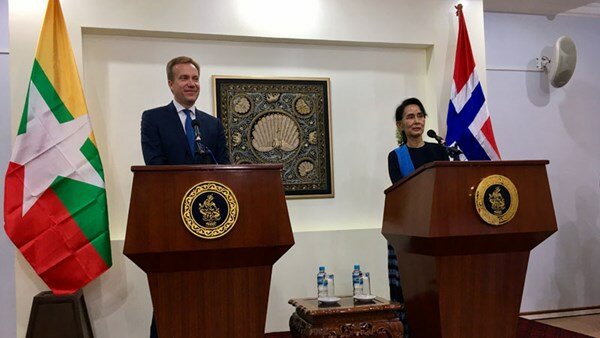Minister of Foreign Affairs Børge Brende visited Myanmar on 5-6 July.
‘The country is undergoing a huge process of change, after the transition from military rule to a partly civilian government. Norway will continue its broad engagement in support of the peace process and sustainable development,’ said Mr Brende.
–
Mr Brende had a long meeting with Aung San Suu Kyi in the capital city Nay Pyi Taw on continued Norwegian support for the process of reform and democratisation. The military still have 25 % of the seats in the national assembly. Despite a ceasefire with a number of groups, armed conflict is continuing in certain areas, and there are considerable tensions between the various population groups in Rakhine state.
–
‘I had an open and frank conversation with Aung San Suu Kyi, in which we discussed the challenges the country is facing and how Norway can best provide assistance. We discussed the situation in Rakhine state, access to humanitarian aid, and support for renewable energy. Norway also attaches importance to ensuring the involvement of women in the peace process and to protecting freedom of expression,’ said Mr Brende.
–
Mr Brende also met the deputy commander in chief of the army, the Minister for Agriculture, ivestock and Irrigation, and the Minister for Religious Affairs and Culture. In addition, he met representatives of armed ethnic groups and of the Advisory Commission on Rakhine State, which is chaired by Kofi Annan and supported by Norway.
–
In total, Norway is providing around NOK 250 million in aid to Myanmar, including for humanitarian efforts in vulnerable areas. This week, the Norwegian Embassy started to support a new media project to strengthen the role of women in the peace process. In addition to its efforts to support the peace process, Norway is supporting projects in the areas of political and economic reforms and the management of natural resources. During Mr Brende’s visit, an MoU was signed on development cooperation in the fisheries sector for a five-year period.
–
‘Norway and Myanmar are both coastal nations with significant marine resources. We would like to promote sustainable management of Myanmar’s fishery resources and help to develop its aquaculture. In the long term, this cooperation could lead to new investments and more jobs in the country,’ said Mr Brende.
–
Norwegian companies such as Telenor, Jotun and Yara and other Norwegian business actors are already helping to create jobs in Myanmar. The country, which has over 50 million inhabitants, has a young population and a weak education sector. Norway is therefore supporting education projects at all levels.
–
At a formal ceremony with the authorities, Mr Brende returned a Buddha sculpture that had been illicitly imported to Norway in 2011. The return of this sculpture is part of Norway’s international engagement to combat the illicit trade in cultural property.
Source: government.no / Norway Today




